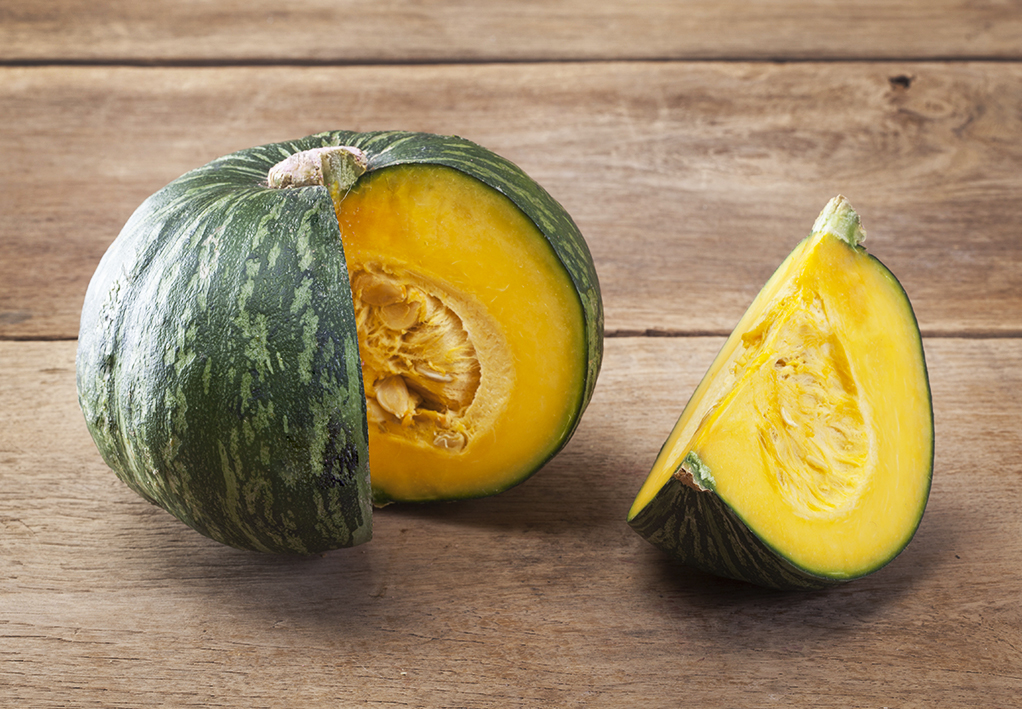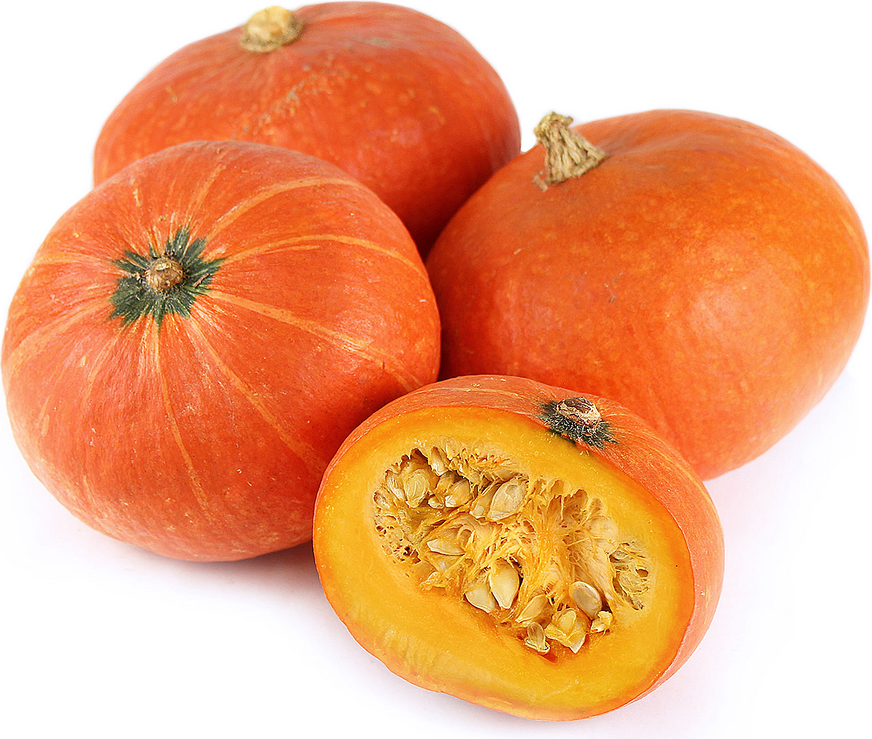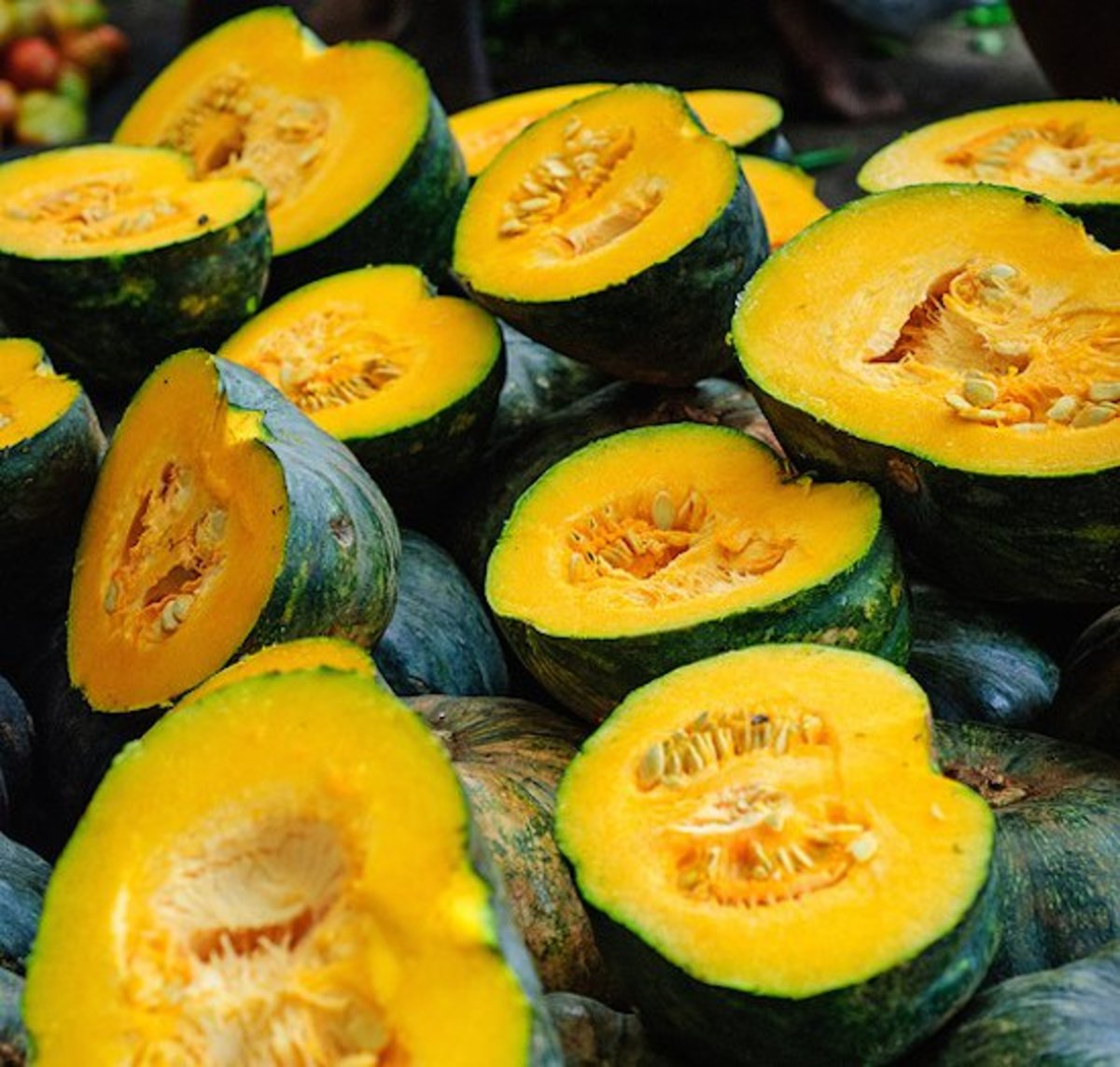Orange Kabocha Squash Information and Facts

Product spotlight Kabocha squash The Sykes Company
It has a hard, dark green, gray, or reddish-orange rind and yellow-to-orange flesh. Kabocha is popular in Japan and is added to dishes like soups and tempura. In Japanese, "kabocha" means.

Healthy Roasted Orange Kabocha Squash Recipe with Cinnamon FFLL
Once boiling, turn the heat to medium low to maintain a simmer. Cover with an otoshibuta and cook for 20-30 minutes (depending on the size of your kabocha pieces and how long it takes the skin to cook). You can tell it's done when the orange flesh of the kabocha has tiny, thin cracks near the skin or a bamboo skewer pierces the kabocha easily.

Sunshine Hybrid Kabocha Squash Seeds — Seeds 'n Such
Place steamer basket in the bottom of the pressure cooker and add 1 cup water. Place squash in/on steamer basket. Secure lid, turn valve to seal, and set for 20 minutes on high pressure. When timer goes off, quick release pressure. Carefully remove squash and let cool enough to handle.

How to Cook a Kabocha Squash in the Oven Kabocha
Using a large spoon, remove the seeds and pith from the center of the squash. Drizzle the cut sides of the squash with 1 tablespoon of the olive oil. Place cut-side down in a roasting pan. Roast until softened and cooked through, about 55 minutes. Meanwhile, dice 1 medium yellow onion (about 1 1/2 cups).

Healthy Roasted Orange Kabocha Squash Recipe with Cinnamon FFLL
Then the kabocha is transferred to a cool place (50 °F/10 °C) and stored for about a month in order to increase carbohydrate content. In this way, the just-harvested, dry, bland-tasting kabocha is transformed into a smooth, sweet kabocha. Fully ripened, succulent kabocha will have reddish-yellow flesh, a hard skin, and a dry, corky stem.

This bright orange kabocha yokan is a Japanese treat made with kabocha
Line a baking sheet with parchment paper. Wash and scrub the kabocha squash well, dry it, and cut it in half with a sharp knife. Then, with a spoon, scoop out the seeds. Now, place one-half of the squash on a cutting board, cut side down. Slice it into 1/3 inch (0.8 cm) slices with a sharp knife.

Pumpkin Orange Kabocha stock photo. Image of scones, food 93584092
Kabocha is a category of squash; most varieties have dark green skin, which is tough and often mottled or streaky, and orange and grey varieties exist too. With its squat shape, kabocha looks like buttercup squash, but without the rounded "turban" on top.

Roasted Kabocha Squash Recipe Love and Lemons
Line 2 baking sheets with parchment paper. Slice the squash in half lengthwise, scoop out the ribbing and seeds, and then slice into 1½-inch slices. Divide the slices among the baking sheets, drizzle with the olive oil, sprinkle with salt and pepper, and roast for 25 to 30 minutes, flipping halfway, until golden brown and tender.

Orange Kabocha Squash Information and Facts
A kabocha squash is about the same size as a sugar pumpkin, though flatter (and not orange!). Botanically, a kabocha squash is a fruit and, as is the case with most fruits, Jet says, you want one.

Pumpkin Orange Kabocha stock photo. Image of eating, golden 93514700
Kabocha squash is round and stout, considered small to medium, averaging from 1.5 to 5 pounds. It has a dark green rind and yellow to bright orange flesh, although there are varieties with different colored skin and flesh. Kabocha was first grown in South America and brought to Japan via Cambodia by Portuguese merchants in the mid-16th century.

10 Killer Kabocha Squash Recipes for the End of Harvest Season
Kabocha squash has dark green skin and an orange interior with a fluffy, chestnut-like texture. Its sweet flavor might remind you of sweet potatoes or the sort of sugar pumpkins you bake into pumpkin pie. The exterior may have faint stripes or bumps, and there are some orange-skinned kabocha as well. Historians trace the roots of kabocha squash.

Mini Orange Kabocha squashes Melons & Squashes Pinterest Squashes
Kabocha squash is a staple at any Japanese restaurant. This bright orange fruit is often served battered and fried in vegetable tempura. It can easily be mistaken for sweet potato due to its color, velvety texture, and buttery flavor. Kabocha squash is a staple at any Japanese restaurant. This bright orange fruit is often served battered and.

Orange Kabocha Squash Pudding (Dairy and EggFree, AIP) Zesty Paleo
Reheat: Warm Japanese pumpkin in the microwave, or in a 350 degree F oven for 10-15 minutes until warmed through. Freeze: You can freeze both cooked and uncooked kabocha squash. For uncooked squash, peel, seed, and cut it into portions before storing in airtight containers for up to 12 months.

Pumpkin Orange Kabocha stock image. Image of mottled 93514711
Preheat oven to 375°F. Cut kabocha squash into chunks and slice red onion into half-moons. Place ingredients in a bowl and season with salt, black pepper, and thyme. Drizzle with olive oil and honey, then incorporate well. Line baking sheet (or dish) with parchment paper, place the marinated vegetables on it and transfer to oven.

Healthy Roasted Orange Kabocha Squash Recipe with Cinnamon FFLL
Directions. Preheat the oven to 425°. Microwave the squash for 3-5 minutes. Cut the kabocha squash in half. Remove the seeds with a spoon and discard. Peel the squash, and cut it into slices. Place the cut squash on a baking sheet. Drizzle the squash with olive oil, and sprinkle with salt and cinnamon.

Pumpkin Orange Kabocha stock photo. Image of squash, squat 93584080
Kabocha squash is a small to medium-sized winter squash with a hard, dark green skin and sweet flavor, commonly prepared by simply roasting. It can be used in all kinds of sweet and savory dishes, like soups, stews, casseroles, and curries, as well as muffins, quick breads, pies, and cookies.